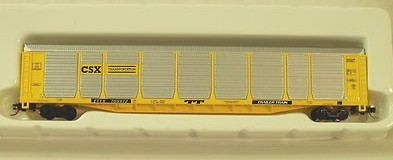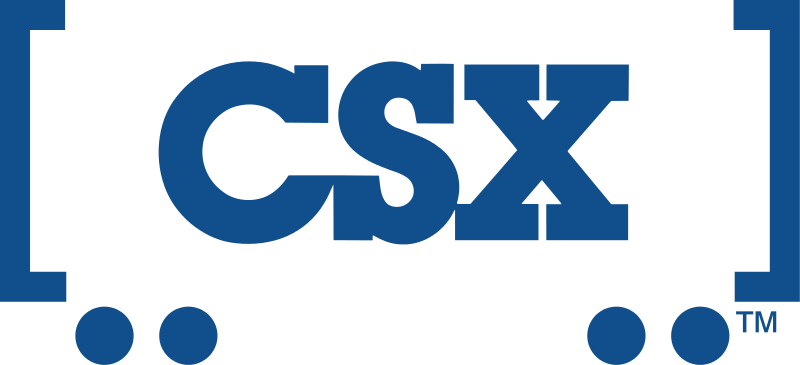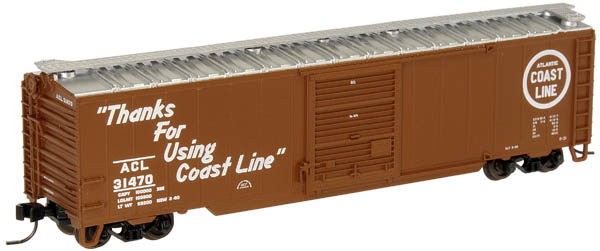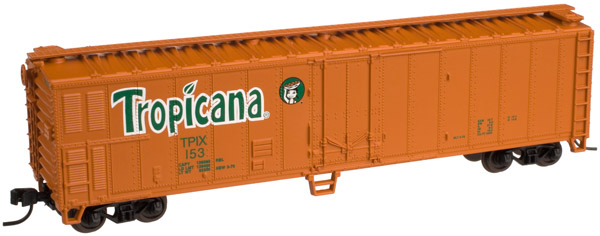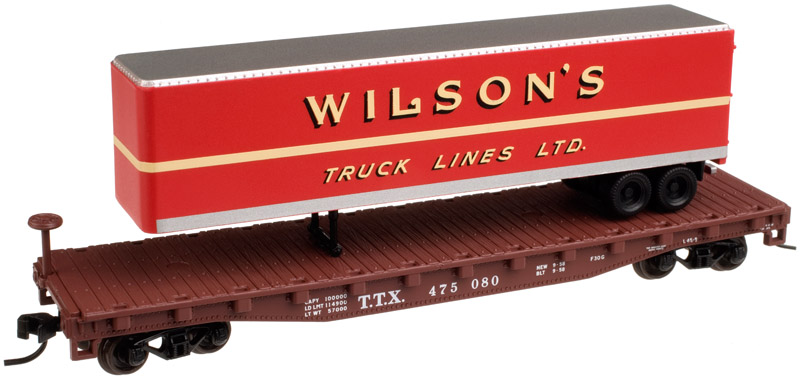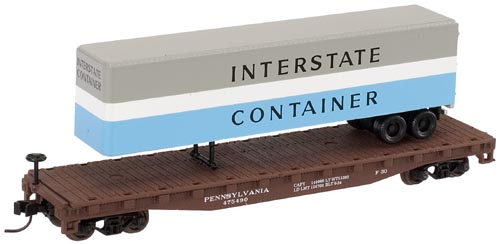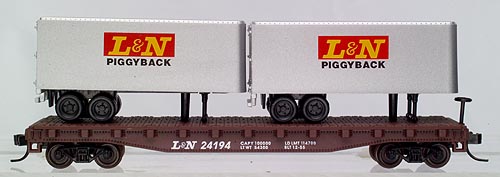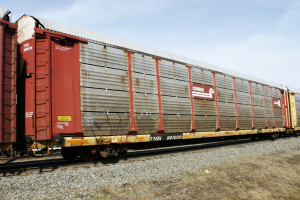Model Information: Con-Cor released this model sometime in the late 1980s or 1990s. Con-Cor markets these as Tri-Level autoracks, but it is clear from the end-doors that these are bi-level models. They are a copy of the Walthers HO autorack kit. Unlike many Chinese-made models from the 1980s and 1990s, these use metal wheelsets (or at least the sample we have does). They are weighted with two 1/4 oz weights inside the model, one at each end, presumably to improve tracking.
Prototype History: For many years, automobiles were carried in boxcars like other freight. The relative light weight of the cars for their size meant that these boxcars reached their volume capacity far faster than their weight limit. Loading cars through the side doors was also challenging and inefficient. End door boxcars helped with the loading, but could still only be loaded one at a time. Due to these limitations, modified flatcars, known as autoracks, began to appear in the 1960s. At first, these cars were open sided, with the cargo exposed, but later cars added the protection of aluminum sides to enclose the automobiles within.
Enclosed autoracks come in two basic configurations. Bi-level racks have a two decks: the floor of the flatcar itself, as well as one elevated deck. These cars can haul two rows of taller vehicles like vans and trucks. Tri-level racks have an extra deck and can carry three rows of conventional automobiles. Up until the 1990s, tri-level cars were far more common, but with the rise in popularity of the SUV, the number of bi-level cars has grown quickly over the past 20 years.
Enclosed autoracks come in two basic configurations. Bi-level racks have a two decks: the floor of the flatcar itself, as well as one elevated deck. These cars can haul two rows of taller vehicles like vans and trucks. Tri-level racks have an extra deck and can carry three rows of conventional automobiles. Up until the 1990s, tri-level cars were far more common, but with the rise in popularity of the SUV, the number of bi-level cars has grown quickly over the past 20 years.
Road Name History: CSX Transportation (reporting mark CSXT) is a Class I railroad in the United States. The main subsidiary of the CSX Corporation, the railroad is headquartered in Jacksonville, Florida, and owns about 21,000 route miles (34,000 km). CSX operates one of the three Class I railroads serving most of the East Coast, the other two being the Norfolk Southern Railway (NS) and Canadian Pacific Railway. It also serves the Canadian provinces of Ontario and Quebec. Together CSX and Norfolk Southern Railway have a duopoly over all east-west freight rail traffic east of the Mississippi River. As of October 1, 2014 CSX's total public stock value was slightly over $32 billion.
CSX Transportation was formed on November 1, 1980, by combining the railroads of the former Chessie System with Seaboard Coast Line Industries, and finally with the Seaboard System Railroad in 1986. The originator of the Seaboard System was the former Seaboard Air Line Railroad, which previously merged with the Atlantic Coast Line Railroad in 1967, and later with the Louisville & Nashville Railroad, as well as several smaller subsidiaries such as the Clinchfield Railroad, Atlanta & West Point Railroad, Monon Railroad and the Georgia Railroad. The origin of the Chessie System was the former Chesapeake & Ohio Railway, which had merged with the Baltimore & Ohio Railroad, and the Western Maryland Railway.
Read more on Wikipedia.
CSX Transportation was formed on November 1, 1980, by combining the railroads of the former Chessie System with Seaboard Coast Line Industries, and finally with the Seaboard System Railroad in 1986. The originator of the Seaboard System was the former Seaboard Air Line Railroad, which previously merged with the Atlantic Coast Line Railroad in 1967, and later with the Louisville & Nashville Railroad, as well as several smaller subsidiaries such as the Clinchfield Railroad, Atlanta & West Point Railroad, Monon Railroad and the Georgia Railroad. The origin of the Chessie System was the former Chesapeake & Ohio Railway, which had merged with the Baltimore & Ohio Railroad, and the Western Maryland Railway.
Read more on Wikipedia.
Brand/Importer Information: Con-Cor has been in business since 1962. Many things have changed over time as originally they were a complete manufacturing operation in the USA and at one time had upwards of 45 employees. They not only designed the models,but they also built their own molds, did injection molding, painting, printing and packaging on their models.
Currently, most of their manufacturing has been moved overseas and now they import 90% of their products as totally finished goods, or in finished components. They only do some incidental manufacturing today within the USA.
Important Note: The Con-Cor product numbering can be very confusing. Please see here in the article how to properly enter Con-Cor stock numbers in the TroveStar database.
Currently, most of their manufacturing has been moved overseas and now they import 90% of their products as totally finished goods, or in finished components. They only do some incidental manufacturing today within the USA.
Important Note: The Con-Cor product numbering can be very confusing. Please see here in the article how to properly enter Con-Cor stock numbers in the TroveStar database.
Item created by: cwarczinsky on 2016-04-18 18:02:51. Last edited by gdm on 2020-12-20 07:34:24
If you see errors or missing data in this entry, please feel free to log in and edit it. Anyone with a Gmail account can log in instantly.
If you see errors or missing data in this entry, please feel free to log in and edit it. Anyone with a Gmail account can log in instantly.


